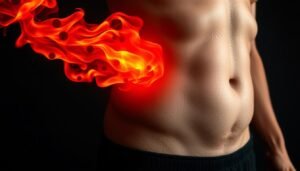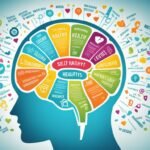Get our FREE E-Book HERE - 120 TIPS for Losing Weight & Bonus Tips for Postpartum Weight Loss & Dad’s Postpartum Experience
Does Eating Fast Make You Gain Weight?

If you eat fast, your weight might be at risk more than you know.
Fast eaters have up to a 115% higher chance of becoming obese than their slower counterparts.1
One study looked at over 4,000 middle-aged people. It found that those who ate very fast were heavier.
They also gained the most weight since their early 20s.1 So, can eating fast lead to gaining weight?
This is a serious issue you should pay attention to.
Key Takeaways:
- Fast eaters are up to 115% more likely to be obese than slower eaters1
- 60% of children who ate rapidly also overate, and fast eaters were 3 times more likely to be overweight2
- Fast eaters have a 2.5 times higher risk of developing type 2 diabetes compared to slow eaters3
- Eating without distractions and chewing food thoroughly can help slow down your eating pace2
- Mindful eating techniques can aid in weight loss and improved health3
The Link Between Eating Fast and Weight Gain
Research shows that eating quickly can make you put on extra pounds. People who eat fast are more likely to be overweight. In fact, they have up to a 115% higher risk of obesity than those who eat slowly.4
Those who gulp their food also tend to pack on more weight over time. This was shown in a study of over 4,000 adults.
The ones who ate very quickly were heftier and had gained the most weight since they were 20 years old.
Studies Show Fast Eaters Tend to be Heavier
Eating quickly may lead to overeating because your brain doesn’t get the signal that you’re full. Hormones control your hunger and food intake. After a meal, your gut switches off hunger with a hormone called ghrelin.
It also sends out fullness hormones. This whole process takes about 20 minutes. So, eating slower helps your brain catch up and feel satisfied.
Studies indicate that slow eating boosts the levels of these fullness hormones.
This might lower how much you eat.2
Eating Quickly Leads to Overeating
Fast eating can cause kids to overeat too. A study found that 60% of quick-eating children also overate.
They were three times more likely to be overweight than slower eaters.2 A review of 23 studies also confirmed this for adults. Fast eaters were twice as likely to be obese compared to those who ate slowly.
Chomping your food down too fast is tied to higher chances of insulin issues. People who eat quickly are 2.5 times more likely to get type 2 diabetes. They are also at a higher risk for metabolic syndrome.
Why Eating Fast Promotes Weight Gain

Your brain needs around 20 minutes to understand you’re full. Eating too quickly makes it simple to consume more food than your body requires. A study on kids showed 60% of fast eaters overate. Plus, those fast eaters were three times more likely to be overweight.2
Your Brain Needs Time to Register Fullness
Eating quickly can lead to overeating. This is because your brain doesn’t get the chance to realize you’re full. It takes about 20 minutes for your gut to send ‘full’ signals to your brain. By slowing down, you give your brain the opportunity to catch up. This can help you eat just the right amount and reduce overeating.2
Fast Eating Reduces Satiety Hormone Release
Studies show that eating slowly boosts the level of fullness hormones in your body23. Eating at a moderate pace improves digestion and enhances how much you enjoy your food. This approach can make every meal more satisfying.2
Eating Fast and Other Health Risks
Eating too quickly can raise your chances of having insulin resistance. This leads to high blood sugar and insulin. It’s a key sign of type 2 diabetes and metabolic syndrome.5
Increased Risk of Insulin Resistance
People in their middle age who eat fast face more insulin resistance risk. This risk might lead to diabetes as time goes by.5
Higher Likelihood of Type 2 Diabetes
People who eat fast are more likely to develop type 2 diabetes.
A study shows fast eaters have a 2.5 times higher risk than slow eaters.5
Poor Digestion and Food Enjoyment
Fast eaters often have issues with digestion. They tend to take bigger bites and not chew much. This can impact how well their bodies break down food. Fast eaters also find their meals less enjoyable than slow eaters do.5
Techniques for Slowing Down Your Eating

Eating too fast isn’t good for your health or keeping a good weight. Luckily, there are well-known ways to help you eat slower. This can have positive effects.6
Avoid Distractions While Eating
Eating while watching TV or staring at your phone can make you eat quick. It also makes keeping track of how much you’ve eaten harder.7
Chew Your Food Thoroughly
Chewing your food well can lower the number of calories you take in and help with losing weight. Research shows that people who have trouble with their weight often chew less.8
Stay Hydrated During Meals
Drinking water with your meal makes you feel full. It also slows down how quickly you eat.8
Practice Mindful Eating
Mindful eating means really thinking about the food you’re eating. It can help you eat slower and notice if you’re really hungry or full.8
The Importance of Slowing Down Your Eating Pace
Eating quickly is a common habit that can lead to health issues. These include obesity and type 2 diabetes.8
If you’re trying to lose weight, eating fast might be holding you back. However, slowing down has big benefits. It can boost hormones that make you feel full, increase satisfaction, and lower calorie intake.9
Techniques to eat slowly include chewing well and drinking water during meals.8 It also means avoiding distractions and eating mindfully. Over time, these methods help you eat healthier. They give your brain time to realize when you’re full, which means you’ll eat fewer calories and stay at a healthy weight.9
Though it might be easy, eating fast has downsides. But, choosing to eat slowly can be really good for your health and happiness.
With simple techniques, you can fully enjoy your meals. This not only feels good but also helps with your health goals.8
FAQ
Does Eating Fast Make You Gain Weight?
How Does Eating Quickly Lead to Overeating?
What Other Health Risks are Associated with Eating Fast?
What Techniques Can Help Slow Down Your Eating Pace?
Source Links
- https://www.healthline.com/nutrition/eating-slowly-and-weight-loss
- https://www.healthline.com/nutrition/eating-fast-causes-weight-gain
- https://www.vinmec.com/en/news/health-news/general-health-check/does-eating-fast-chewing-fast-make-you-gain-more-weight/
- https://www.ncbi.nlm.nih.gov/pmc/articles/PMC7353031/
- https://www.cleaneatingmag.com/clean-diet/food-health-news/5-health-risks-of-eating-too-fast/
- https://www.gundersenhealth.org/health-wellness/eat-move/how-to-eat-slower-and-actually-enjoy-your-meals
- https://www.eatingwell.com/article/8041411/how-to-eat-slower/
- https://health.clevelandclinic.org/why-do-i-eat-so-fast
- https://www.webmd.com/obesity/features/slow-down-you-eat-too-fast








